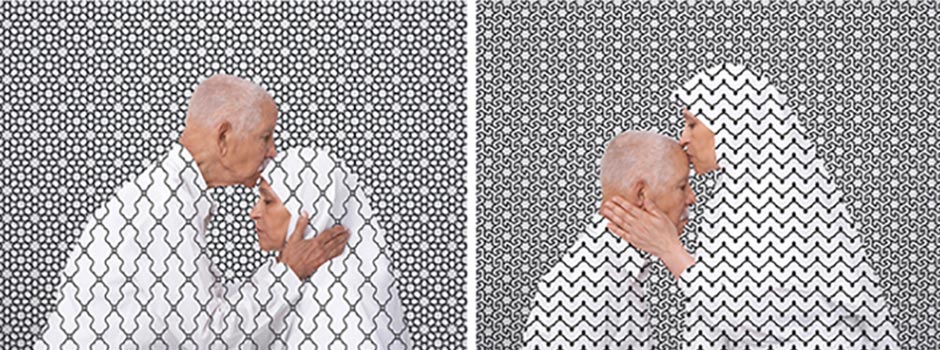
Exhibition at the London Print Studio (Oct 20 - Nov 7, 2015) ‘Birthmark Theory’ Exhibition, a First UK Solo for the Libyan-Canadian Visual Artist Arwa Abouon
Oct 26, 2015 Exhibition

Partnering with the ‘Nour Festival of Arts’ 2015, Noon Arts are curating the artworks of Arwa Abouon to be shown at the London Print Studio. This exhibition will run alongside the wider festival that annually celebrates contemporary Middle Eastern and North African arts and culture and which takes place in venues across the Royal Borough of Kensington and Chelsea.
'Birthmark Theory' is a retrospective exhibition for a London-based audience on Abouon’s work going back over ten years, highlighting some of her most iconic and award-winning pieces to date. The 33 year-old’s unique approach has always been to use the motifs and symbols from her Islamic background and to juxtapose them with her Western-Canadian credentials. She creates pieces that reflect on what defines identity when one belongs to two different cultures. At the same time, she subverts any prejudices that maybe held by outsiders regarding the same.
Courageously employing herself and her family members as art models, her poetic diptychs and installations express and illustrate the possibilities of reconciling what might seem to be at odds influences, of a liberal versus conservative environment and also as to her being a woman. But in the process of introspection and the act of creation, she finds a happy individual medium to celebrate the colourful mix rather than this becoming a source of struggle or conflict.
'Birthmark Theory' features the ‘Mirror Mirror / Allah Allah’ diptych, where Abouon raises religious versus gender issues by using the Muslim veil as a symbol to question inner versus outer spirituality and where she concludes that the most important thing is to see herself through God, as one of his human creations. This won the second prize at the 26th annual Alexandra Biennale for Mediterranean Countries in 2014.
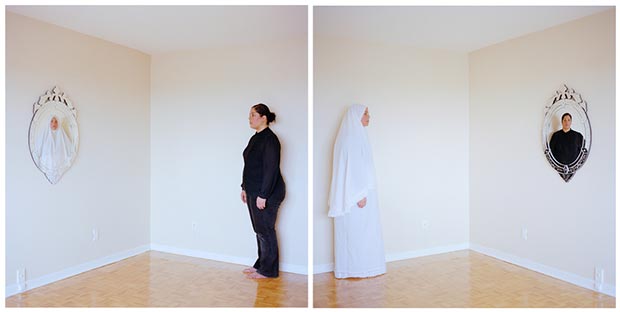 Arwa Abouon, 'Mirror Mirror / Allah Allah', Diptych, 2012, Digital Print, 101.6 x 101.6 cm / Courtesy of the Artist
Arwa Abouon, 'Mirror Mirror / Allah Allah', Diptych, 2012, Digital Print, 101.6 x 101.6 cm / Courtesy of the Artist
In the ‘I’m Sorry / I Forgive You’ diptych, Abouon uses an Islamic geometric design pattern as a background to the gentle act of contact between her parents, set in the private space of worship at home. The piece is to point out both the acts of love and compassion and wanting to elevate them as visual monuments in themselves.
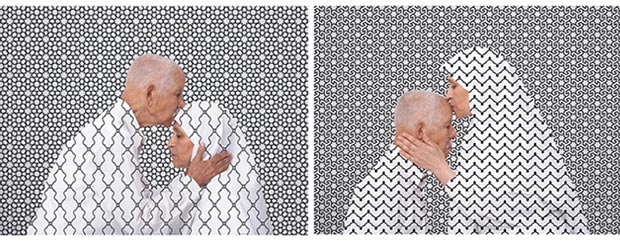 Arwa Abouon, 'I'm Sorry I forgive you', Diptych, 2012, Digital Print, 76.2 x 101.6 cm / Courtesy of the Artist
Arwa Abouon, 'I'm Sorry I forgive you', Diptych, 2012, Digital Print, 76.2 x 101.6 cm / Courtesy of the Artist
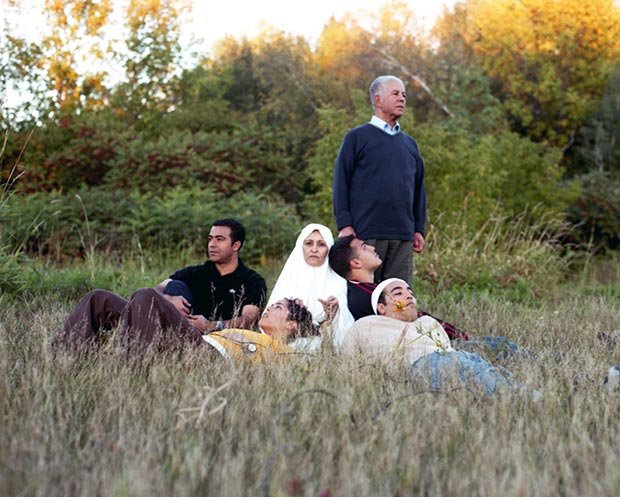 Arwa Abouon, 'Abouon Family', 2004, Digital Print, 50 x 40 cm / Courtesy of the Artist
Arwa Abouon, 'Abouon Family', 2004, Digital Print, 50 x 40 cm / Courtesy of the Artist
Other works include ‘Celestial Sphere’, ‘Generation Series’ and ‘Pear Shape’. The latter is a digital print with mixed media concepts, photography and drawing to represent in a picture the direct interaction between the East and the West and how they impact on the artist’s experience. Done as a visual metaphor, one culture is carrying her forwards and the other one is anchoring her being.
.jpg) Arwa Abouon, 'Generation Series (Father&Son)', Diptych, 2012, digital print 111.76 x 203.2 cm / Courtesy of the Artist
Arwa Abouon, 'Generation Series (Father&Son)', Diptych, 2012, digital print 111.76 x 203.2 cm / Courtesy of the Artist
.jpg) Arwa Abouon, 'Generation Series (Mother&Daughter)', Diptych, Digital Print 111.76 x 203.2 cm / Courtesy of the Artist
Arwa Abouon, 'Generation Series (Mother&Daughter)', Diptych, Digital Print 111.76 x 203.2 cm / Courtesy of the Artist
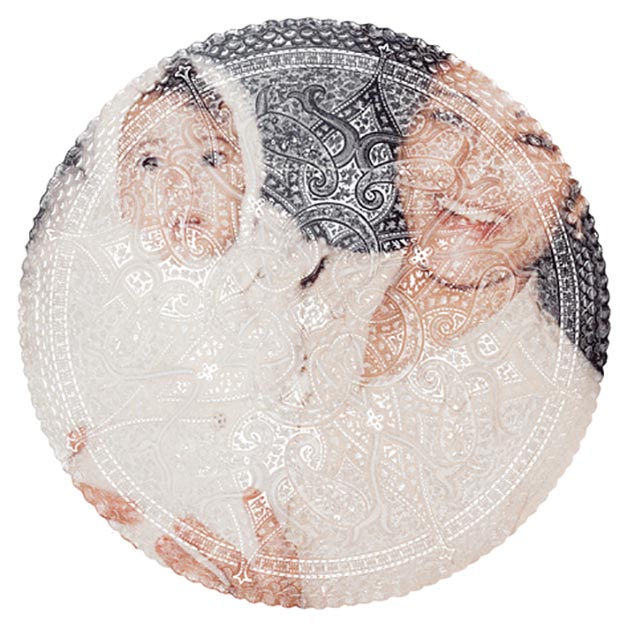 Arwa Abouon, 'Celestial Sphere', 2005, Digital Print, 76.7 x 81.3 cm / Courtesy of the Artist
Arwa Abouon, 'Celestial Sphere', 2005, Digital Print, 76.7 x 81.3 cm / Courtesy of the Artist
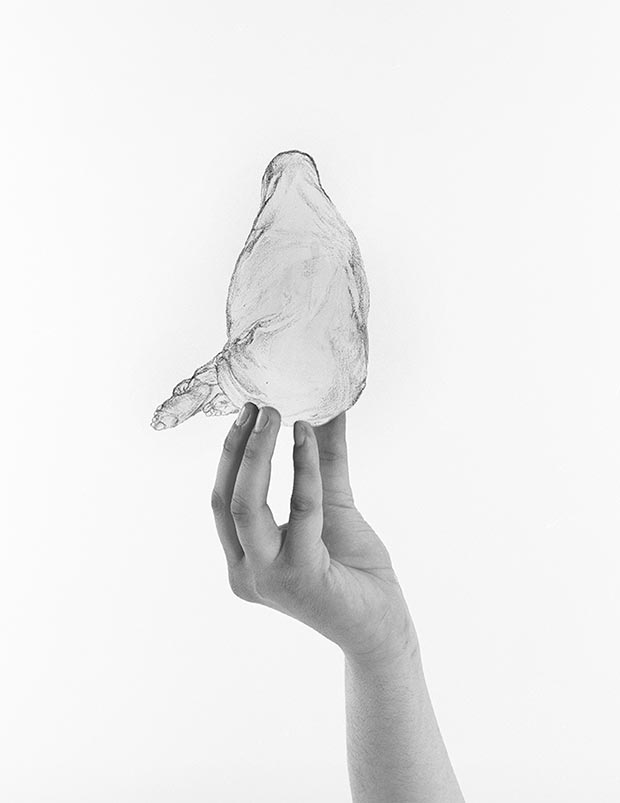 Arwa Abouon, 'Pear shape', 2005, Digital Print,, 30.4 x 20.4 cm / Courtesy of the Artist
Arwa Abouon, 'Pear shape', 2005, Digital Print,, 30.4 x 20.4 cm / Courtesy of the Artist
Arwa Abouon, has provided this statement about her work: “My work results from the dynamic interactions between personal reflections on human nature, an attempt to meet and see the world as it is, and the multiple perspectives of my own gaze. The attempts to visually translate these specific configurations of subject, time, and place are usually photographic, but also sometimes integrate video, design or additional installations.
The themes addressed stem directly from my life experience as a female bicultural artist, and yet the aim is to show how a single person's ‘double vision’ can produce images that possess much wider social and political effects by collapsing racial, cultural and religious borders. In other words, the images seemingly autobiographical in nature move beyond simple autobiography. Like the state of biculturalism itself, they unpack the categories of ‘East’ and ‘West,’ merging them and hence underscoring their similarities rather than differences.
I am investigating mechanisms at play when learning and acquiring knowledge, and the different shapes that this knowledge takes on as it is transferred from one generation to another. Balancing playful humor, re-appropriation and respectful homage, I hope my work is always visually intricate in the subtleties within its voices.â€
Abouon’s work has already exhibited in Canada, the United States of America, Germany, Kuwait, the United Arab Emirates and Malta. Some of her works are part of several private and public collections, including: the Musée de L'Institut du Monde Arabe and the Stanly Mills Collection. Arwa Abouon is represented by The Third Line, Dubai, UAE.
'Birthmark Theory' is on view from October 20 - November 7 at the London Print Studio.
Comments
Add a comment